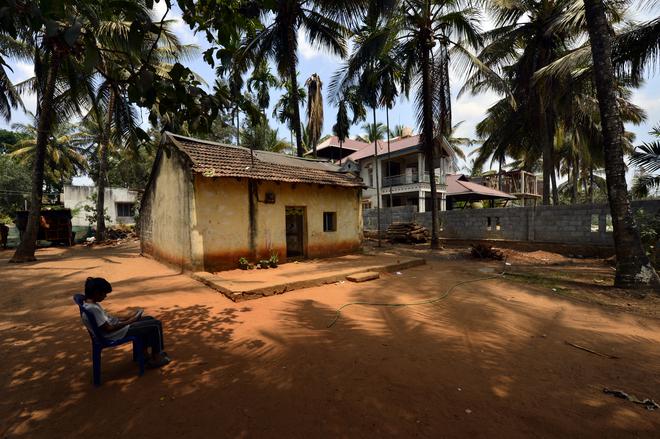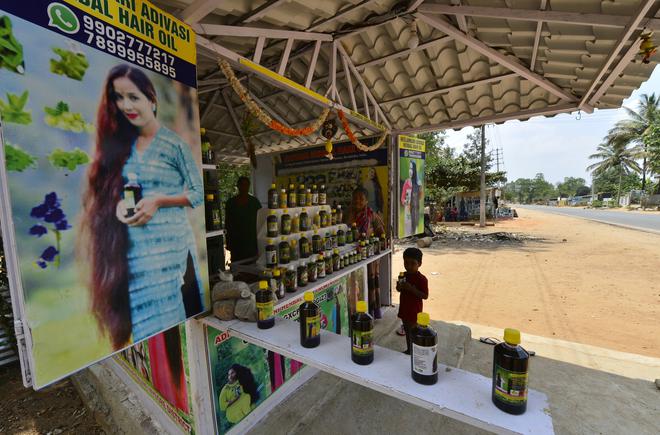Karanthai, 23, an anganwadi teacher in Pakshirajapura, a colony for the nomadic tribe Hakki Pikki, six kilometres away from Hunsur town in Mysuru district, was cleaning fish for lunch in her house on a hot afternoon as she waited anxiously for almost 15 days for her mother, two brothers, and their wives who were stuck in violence-hit Sudan. They had travelled to Sudan around eight months ago to sell traditional medicine there, which is in huge demand. The family was on tenterhooks, stuck in a rented house with little food and water.
Her brother Manu, who was stuck in the conflict in the African country, said, “We thought we would die. Fortunately, we returned. We thank our people for their support and the government’s help.”
Back home to vote
A week ago, they returned home safely and even voted in the Karnataka State Assembly elections held on May 10, Wednesday. However, with huge sums taken as loans for travelling, and no avenue to earn to pay that back, many are willing to risk travelling to other African countries to try their luck.
Around 600 people from the Hakki Pikki tribe were stuck in Sudan, and almost everyone has returned home, according to Karnataka State Disaster Management Authority (KSDMA) officials. They arrived back in the State after the Ministry of External Affairs launched Operation Kaveri on April 24 to evacuate Indian citizens stranded in conflict zones in Sudan safely.

Bird catchers to traditional medicines
Vani, 45, who recently returned from Sudan along with a group of 31, had been in Sudan for the past 10 months to sell traditional medicine, while many other members of the community have been travelling to African countries for the last 15 years.
There are two colonies dedicated to the Hakki Pikki community in Hunsur, which was established by the Karnataka government in 1958. Around 1,500 people live in this colony, and their main business is the production of various traditional oils and medicines, which according to them are in huge demand across the country.
Hakki Pikkis (bird catchers) are a semi-nomadic tribe that travelled to Karnataka from parts of Gujarat and Rajasthan at least 100 years ago and were into bird catching and hunting. However, in the last 20 years, they have started to prepare traditional medicines, especially hair oils, which they sell to various parts of the country and also ship abroad. The community left bird catching and hunting after it was outlawed under the Wildlife Protection Act of 1972.
Speaking to The Hindu at his house in Pakshirajapura, P.S. Nanjunda Swamy, State president of the Karnataka Adivasi Budakattu Hakki Pikki Sangha, said, “My ancestors came from various parts of Gujarat and Rajasthan. We first settled in Hyderabad for some time and later moved to Bengaluru and then to Mysuru in the 1950s, where the government gave us this colony to settle down. Now, there are around 11,800 members in our community settled in Davangere, Bannerghatta in Bengaluru, Chikkamagaluru, Hassan, Shivamogga.”

“Life-changing medicine”
The community members belong to the Scheduled Tribes and speak Vaagri Booli, which is an Indo-Aryan language. This language is used only in their house, and outside they speak Kannada. A few people from the community went to neighbouring Kerala and learnt the preparation of traditional medicine and started to prepare it. In this, the hair oil made of various herbs available in the forest has changed the life of the community, particularly in Pakshirajapura.
Pakshirajapura, which once had only small houses, now has several modern houses and high-end cars. Most houses have mini production centres to produce traditional medicine. The members of the community say that all this was possible because of going to African countries.
Financial problems
However, Mr. Nanjunda Swamy said, “Many in our community have prospered, but they have taken a lot of loans. The other issue our community faces is that many educated young boys don’t want to take up government or private jobs. They discontinue their studies and get into this business taking loans, and if it doesn’t work, they suffer.”
During this conversation, Maitriya, 65, who was in a petty shop close by, jumped in and said that her son took a loan too and got into the traditional medicine business and suffered a loss. Now, he has opened a tea stall that is also under loss, she said.
The contrast is clear: while some from the community have become rich, others who tried the traditional medicine business and experienced severe loss are living in small houses in the colony.
Apart from traditional medicines, the community also sells and manufactures small daily-use products and ornaments like copper rings and chains, toys made of wood and sell bird feathers.

Social media and online platforms
But the success stories from the traditional medicine business, especially hair oil, are big.
Prerana, 45 and her daughter Moksha, 22, have started selling hair growth oil on online marketplaces, even advertising on social media to get more customers. The mother-daughter duo have all the equipment for production and laptops and packaging materials to sell their products online. They both point to their own long hair, claiming to have reaped the benefits of the hair oil.
Moksha gets at least 15 to 20 calls daily asking about the product as well as sales. While she was speaking to The Hindu, she received one such call from a customer in North India. “Earlier, we used to sell our products in markets here in Mysuru and Bengaluru. Three years ago, we realised that online has great potential, and we can sell our products. Now, monthly, we get revenue in lakhs,” Moksha added.
Mr. Nanjunda Swamy said that the community members got to know about the demand for traditional medicine in African countries from a few travel agents in Mysuru. “For the last 10 years, many have travelled to African countries. They take raw materials in cargo flights and prepare oil and medicine and sell them to people there. Our people stay there for a year and return with a profit, but sometimes they suffer a loss too. They go under many challenges, like this Sudan incident,” he added.
In and around Mysuru
Meanwhile, many in this community sell their traditional medicines on the main roads in and around Mysuru. People commuting on Hunsur-Nagarahole road can see many small shops named ‘Mysore jungle Adivasi herbal hair oil’ with claims of the oil being made from secret traditional methods. Chandini, one of the shop owners on Nagarahole Road, said, “All these ingredients are sourced from the forest and manufactured using secret methods. There is a huge demand locally, and we make at least ₹5,000 daily by selling this oil. Tourists going to Kodagu and Nagarahole buy our traditional oils.”
Another woman from the community, Saroja, said that one 750ml bottle of hair oil cost ₹1,500 and the massage oil costs ₹1,000 to ₹2,500.
‘Shift us to other countries’
However, the profit they make abroad is incomparable. This was clear when amid Operation Kaveri to rescue Indians stuck in Sudan, family members of the stranded Hakki Pikki community in Hunsur said that they didn’t want the members stuck in that country to come back to India; rather, they wanted them to be shifted to the neighbouring countries so they can continue to sell their products and make a profit and return as all of them have taken loans.
Managala, a Hakki Pikki member in Hunsur, said, “They have taken a lot of credit running into lakhs of rupees from various sources, and went to Sudan a few months back with all the raw materials for the traditional medicines. Now, due to the conflict, all are coming back. Now we are worried about how we can repay the loan we have taken.”
Subhas, whose brother was stuck in Sudan, said that his brother’s family had taken ₹10 lakh loan and went to Sudan. “All these loans are taken from a few residents out of the colony. Now they have to return it to the lenders. How can we do it? We all hoped that they would do business of at least ₹20 to ₹30 lakh and return with good profit.”
In fear, without food and water
Those who returned home recalled the nightmares they lived. Shivananda and his wife, from the Hakki Pikki tribe, had been stuck in the city of El-Fasher for more than 20 days after the conflict started, where they had to face hardship, living in fear and without proper food and water. He had been in Sudan for the last 10 months to sell traditional medicine.
“The day the conflict started, we moved to El-Fasher and started to live in a small rented house along with 40 other persons. We heard a firing outside and lived in fear. Parts of our house were damaged, and a bullet made a hole in a wall during the crossfire. We were not able to go out due to continuous gunfire and shelling. Hence, we didn’t have enough to eat for days,” Shivananada said, now back safely.
Nanda Kumar, another Sudan returnee, said, “There was no access to food or drinking water for four days until April 16, and somehow the firing stopped for a day, and we managed to get some ration when one shop in the locality opened for some time. After this, we got information that India was rescuing us, and we hopped into a bus and travelled to Port Sudan for a whole day. From there, we were rescued by the Indian government. We were in a very bad situation and had all doubts that we would be able to meet our family here.”







